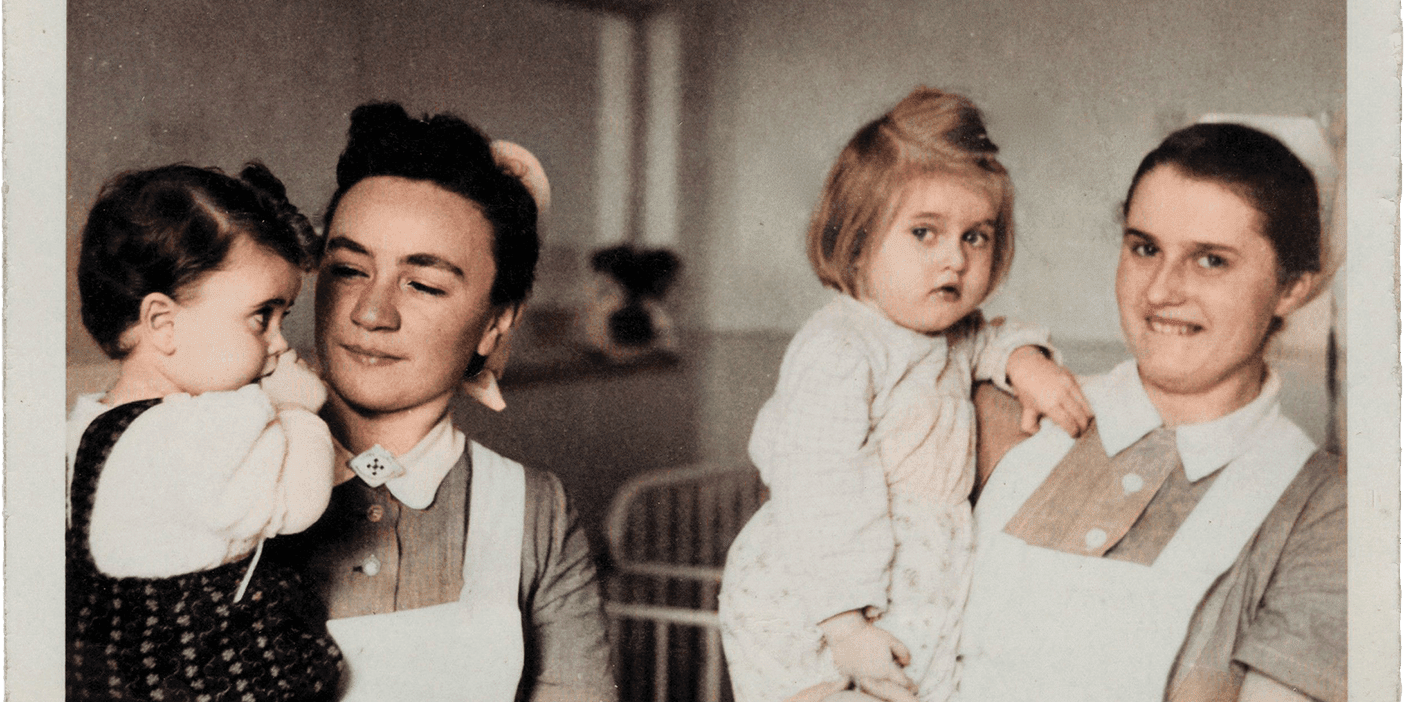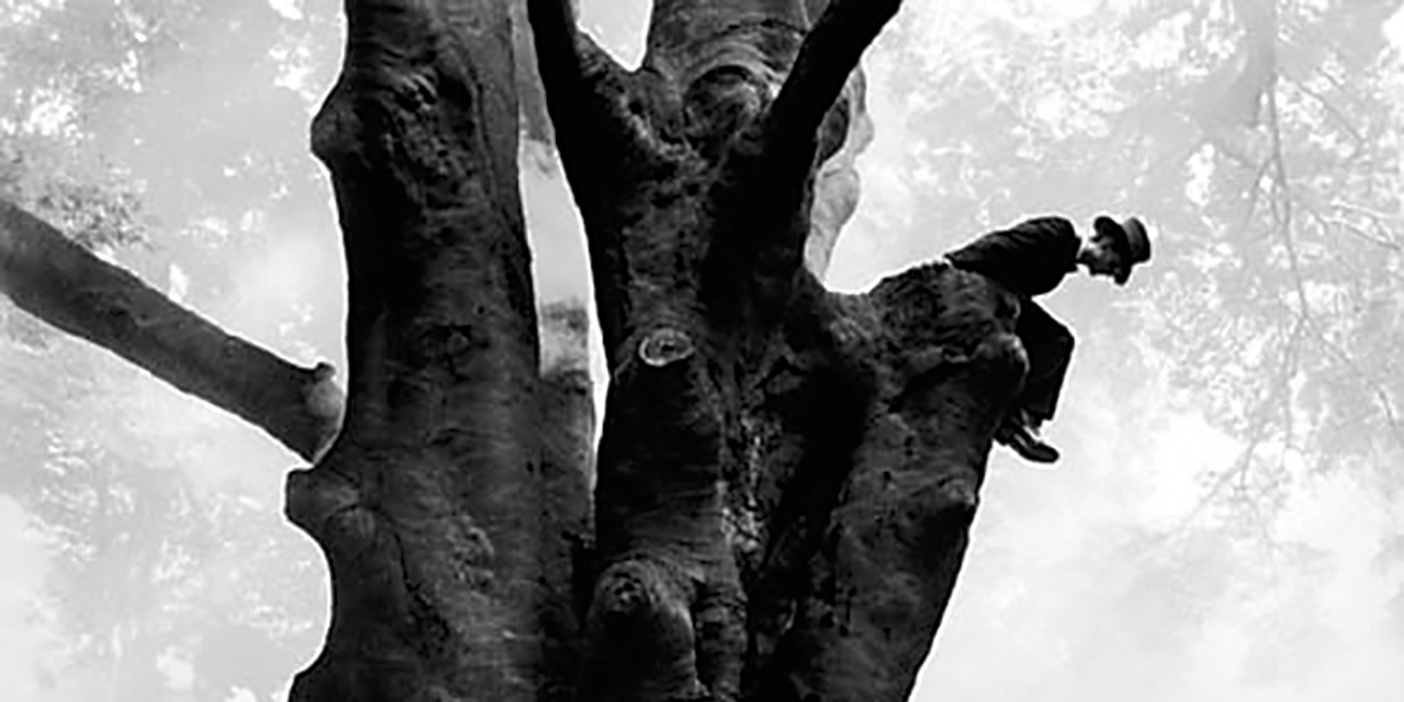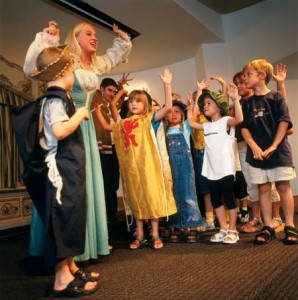
Children at the Orem Public Library join Rebba Witham, ’01, in a Shakespearean dramatic scene. Witham and others in the BYU Shakespeare Fellowship reach out to the community through a variety of Shakespeare-related activities.
By M. Sue Bergin, ‘79
Eight-year-old Tashina Osman doesn’t look much like a witch from Shakespeare’s Macbeth as she circles an imaginary cauldron in her capris, chunky sandals, and T-shirt. But her voice is gravelly and her billowing arms malevolent as she delivers her line: “Round about the cauldron go; In the poisoned entrails throw.”
Tashina and five cohorts ages 7 to 9 are spending part of their summer vacation on BYU campus learning how to act. A one-week workshop sponsored by BYU‘s Shakespeare Fellowship teaches them the basics of using their bodies and voices to create characters. At the end of the week, they’ll perform the Macbeth scene plus a Hamlet ghost scene for family and friends.
“I like how I can make different voices and be different people,” says Tashina. “It makes me feel like I’m not scared.”
To most adults it might seem preposterous to initiate children into acting with the demanding works of Shakespeare. Why not a Dr. Seuss adaptation or a scene from The Secret Garden?
“Children don’t know they’re doing something hard,” says Shakespeare Fellowship director Pamela Blackwell Mayes. “It’s fun for them to know that we’re passing on language that’s 400 years old.”
The summer acting workshop is just one component of the fellowship’s outreach mandate. Others include one-hour performances for elementary school children by the BYU-student-staffed Black Swan Company, daylong workshops for teachers, a one-hour lecture about Shakespeare’s time, after-school Shakespeare programs in the Provo and Orem public libraries, adult acting training, comedy improvisational workshops, and summer theater at Thanksgiving Point.
George D. Nelson, ’77, an associate professor of theater, says the fellowship’s purpose of reaching out to the larger community fulfills an important element of BYU‘s mission.
“As we take a look at Church expenditures, it’s important to ask what BYU can do that’s different or better than other universities,” says Nelson, who is also the chair of the Education and Theatre for Young Audiences Committee in BYU‘s Department of Theatre and Media Arts. “One of the most powerful places we can work is in creating support to families through theater and media arts.”
Angela K. Hansen of Provo has sent two of her children—Corbin, 12, and Ryley, 7—to the fellowship’s acting workshops, which she believes have been a boon to the two.
“It’s made them more outgoing and brave to talk in public and not be so shy. They don’t say, ‘I don’t want to do that,’ as much,” says Hansen.
As You Like It
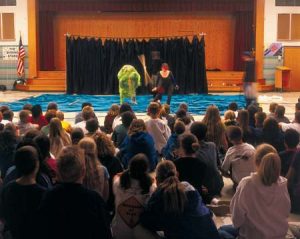
BYU’s Black Swan Company introduces a Salt Lake Valley elementary school to The Tempest. The group performed for 38 schools during the 2001-02 school year.
In two short years, the fellowship has gained a reputation for providing high-quality programs that are in great demand. In summer 2001, a few weeks after sending out a letter to elementary schools in Utah, Mayes had booked the Black Swan Company for the entire 2001–02 school year. The 10-member troupe offered a choice of either a one-hour version of The Tempest or Will Shakespeare’s Greatest Hits, a medley of kid-friendly scenes from some of Shakespeare’s best works. Most schools also opt for a one-hour assembly about Shakespeare’s times typically given a couple of days before the acting company arrives. A modest fee is charged for each program.
One of the schools that grabbed the offer was Peruvian Park Elementary in Salt Lake Valley. Fifthgrade teacher Jackie Sudbury says the program was one of the best the school has ever had.
“The kids were really into it. They got a taste for the time period as well as for The Tempest. I don’t really get into Shakespeare, but the way they did it really was easy for kids to understand—and for me too,” says Sudbury.
The magnetism of the program lies not only in the repertoire but also in the participation fellowship members elicit from children. At the Orem Public Library on a warm summer morning, Black Swan performers Rebeca D. Witham, ’01, of Provo, and Benjamin N. Hess, ’03, of Orlando, Fla., engage more than 50 children in a liberal interpretation of Shakespeare’s A Midsummer Night’s Dream. The kids, roughly ages 3 to 12, have gathered on the floor before a small, low stage bedecked with an ornate storybook-castle front. Witham, her long golden hair flowing against a sky-blue Elizabethan gown, explains the basic storyline in a broadly dramatic voice that draws in even the youngest listeners.
Within a few minutes, she and Hess, costumed in a velvet doublet, have picked a boy to play king of the fairies Oberon and a girl to play queen of the fairies Titania. Hats serve as costumes. Then they choose four more children as characters Lysander, Hermia, Demetrius, and Helena and have them chase each other around the room per the play’s plot.
Next they announce they need 10 fairies, and dozens of hands shoot up. The chosen 10 circle Queen Titania, working their sleep magic on her, and the pursuit continues around the room. Throw in a few Shakespeare lines to keep the Bard in the picture, plus an interlude of Shakespeare-style insults, and the chaos builds to a high-spirited pitch.
By the end of the 45 minutes, the children have been exposed to the most esteemed English-language writer of all time in a way that is accessible, participatory, and fun. Each week throughout thesummer, the two actors will help children tell a different Shakespeare story.
“The point is to get them excited about Shakespeare, to know the stories, to slowly get them to understand the language,” says Witham, who studied theater education at BYU.
During the 2001–02 school year, Witham also helped run a Shakespeare program at the Provo City Library at Academy Square. Once a week for eight months, Witham and others packed a small activity room with about 65 children, introducing them to Shakespeare via sword fighting, costumes, and games. At first the library was skeptical that Shakespeare could draw a crowd.
“We thought, Oh, kids probably won’t be attracted to a program on Shakespeare. Or if they do come it’s maybe because their parents make them come,” says Carla Mittelstadt Morris, ’75, children’s services manager for the Provo library. “But it turned out to be a very popular program.”
Part of the success, she says, is Witham’s “kid appeal.” An original member of the Black Swan Company, Witham has performed for thousands of children, mostly in elementary schools. Now the show manager, she finds performing for children extremely rewarding.
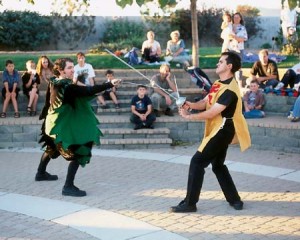
For a family night crowd at Thanksgiving Point, the Black Swan Company puts on Will Shakespeare’s Greatest Hits. The acting company is made up of current and former BYU students.
“I love that we get kids loving Shakespeare before they get to high school and it becomes this big scary thing,” says Witham. “Sometimes as they’re leaving we’ll hear them saying lines from the plays as they’re walking down the hall. We hear a lot of ‘Out, damn’d spot’ and ‘To bed, to bed, to bed.'”
Love’s Labor
Fellowship founder Pam Mayes first had the idea to teach Shakespeare to youth in the 1980s, when her 16-year-old daughter and her friends were interested in acting but found few substantive opportunities at their high schools. Mayes and a friend decided to launch an outlet for the girls, and the Junior Shakespeare Company was born.
“We recruited 50 students the first year from all over Salt Lake Valley. We got some wonderful directors to work with them, and we wrote to schools and asked if they’d like to have a program,” says Mayes. The response was enthusiastic.
She ran the program for about a year, then turned it over to others and moved out of state. When Mayes returned to Utah in the mid-1990s, newly married to a BYU professor and unexpectedly living in Provo, she wanted to contribute to the community. She approached Robert A. Nelson, chair of BYU‘s Department of Theatre and Media Arts, with the Shakespeare outreach idea, and “he practically came over the desk,” she says. The department had long wanted to reach out to the community more, but with budget limitations and faculty members already stretched to their limits, no one could take it on in-house. So Mayes was welcomed with open arms. Donna J. Nielsen, ’86, an author, lecturer, and Renaissance expert, volunteered to join Mayes as cofounder.
For two years Mayes has run the fellowship without pay and mostly from her home in south Provo. Her garage serves as the costume and prop house. To expand her ability to serve the fellowship, Mayes took many theater classes at BYU, adding to her extensive education and experience that include a master’s degree in educational psychology, a secondary-education teaching credential, a special-education credential from BYU, current work on a PhD in psychology, plus 35 years of experience in private-practice counseling, and bylines on short stories, poetry, nonfiction magazine articles, and three novels for Church audiences (under the pen name Blackwell).
During the first season of the fellowship, Mayes and theater professor Barta Heiner, ’71, put together an acting company—the Black Swan Company—of 10 students, including two computer science students and an engineering student. This year the fellowship added Christopher L. Clark, ’00, as the company’s director. Fresh from England with a master’s degree in directing, Clark has worked with the Royal Shakespeare Company. Mostly the Black Swan Company travels to elementary schools, but it has also performed at the Sundance Family Festival and occasionally for troubled youth, who typically are less than enthusiastic when Nielsen arrives for her lecture or the actors step on stage but fully co-opted by the time they leave.
“There’s social and cultural capital in knowing this information,” says Mayes. “At most of Donna’s lectures, by the time she is finished, these kids were all sitting up straight and listening intently.”
The fellowship’s programs benefit the performers as well as the audience, says Mayes. Performing for adults is one thing, but trying to hold the attention of children—especially with the antiquated language of Shakespeare—is a daunting challenge.
“If you’re playing on a main stage at BYU, the audience is adults who have paid to be there and they’re quiet. But if you’re playing to elementary students, you have to go in there and be broad; you have to be entertaining; you have to be able to get at your audience. So the student performers are really working at their craft.”
The “grand old man” of the company, according to Mayes, is Peter J. Biggs, ’03, who came to BYU from England as a part-time instructor in the Computer Science Department. Biggs, who has a PhD in computer science, took an acting fundamentals class and then, on a lark, auditioned for a BYU production of Much Ado About Nothing. He got a part in the show and later tried out for the Black Swan Company. Now he is a graduate student in theater history and criticism, and this fall will be his third season with the fellowship.
“Children understand what we’re doing much more than I initially thought they would. They really get into the scenes. You can tell they’re paying attention, they get the story, they enjoy the characters,” says Biggs.
Mayes is moved by the devotion of company members like Biggs and Witham, who work hundreds of hours each year without pay. They teach children about Shakespeare because, like Mayes, they are passionate about superior drama and ardent in their desire that children develop a taste for Shakespeare early in their lives.
“I’m convinced that you have to work on transmitting culture from one generation to the next. I don’t think it automatically happens,” says Mayes. “If you want something like the love of language and the appreciation for live theater, you have to be proactive and say, ‘Here’s something fun and really worthwhile.'”
Sue Bergin is a writer and editor in American Fork, Utah.
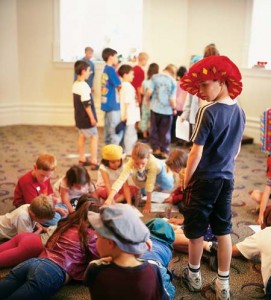
Children at the Provo City Library at Academy Square discover Shakespeare. In addition to library and school programs, the Shakespeare Fellowship sponsors workers for teachers.
AS MERRY AS THE DAY IS LONG
By M. Sue Bergin, ‘79
As Merry as the Day Is Long
It’s 10:30 in the morning, and 300 school children pack the assembly room of Mountain Shadows Elementary School in West Jordan, Utah, for a lecture about Shakespeare and his times. They sit on the linoleum floor, wiggling and whispering and daring their guest to hold their attention. Within minutes, they’ve lost the dare.
How about a Renaissance gift idea for that special boy? asks Donna J. Nielsen, ’86. A favorite in Shakespeare’s time was the “love apple.” She produces a fat, shiny red apple and holds it high.
“First you peel it,” she explains to the children, hushed in anticipation. “Then you tuck it under your armpit for about four days.”
A disapproving hum buzzes through the crowd.
“Then you give it to your sweetheart.”
A wave of “ews” and “yucks” ripples across the room.
“When he wants to think of you, all he has to do is take a whiff.”
Howls and moans echo for a solid minute.
Nielsen has the punch line down flat after presenting her lecture to some 50 elementary schools along the Wasatch Front during the 2001–02 school year. That’s about 10,000 students, making her something of a celebrity. She’s occasionally recognized in the grocery aisle or movie theater as “the Shakespeare Lady.”
“After the kids learn these things, all their lives they’re not intimidated by Shakespeare,” says Nielsen after the lecture. “I love seeing kids totally unintimidated and feeling smart.”
Because her audiences are so young, Nielsen makes sure Shakespeare lines and Renaissance history are integrated with funny, gross, and fascinating facts—most of which also instruct. For example, after sharing a popular proverb from Shakespeare’s day, she discusses the status of women in society at the time. Although many may not have regarded women well, she says, Shakespeare had a more elevated view of women and has many of his meatiest speeches spoken by female characters.
Nielsen offers a host of tidbits from Shakespeare’s times with which to impress one’s peers:
• “Greensleeves” was the number-one hit song in England for 50 years, and Shakespeare included a lot of words from it in his plays.
• A big gut and thick calves in men was considered attractive because fat meant rich. So men stuffed the front of their shirts to look fatter and wore fancy stockings–sometimes a different color on each leg–to draw attention to their legs.
• Medieval scholar and theologian Erasmus created some rules about manners for children, including the recommendation that if you need to hurl, don’t hold it in–just do it and let the dogs clean it up.
• No one ate with a fork because forks had three tines, and everyone knew the devil’s pitchfork had three tines. Our forks today have four tines for that very reason.
• The coronation dress for Queen Elizabeth I weighed 500 pounds, and she needed four men to help her carry it.
• Green was the color of love, and different colors of green meant different kinds of love. Romantic love was a lovely shade of goose turd.
• Churches were cold in winter, so people took small pets with them to church to help them stay warm.








